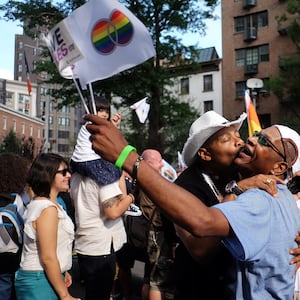In this special series, LGBT celebrities and public figures talk to Tim Teeman about the Stonewall Riots and their legacy—see more here.
Gideon Glick is an actor, currently on Broadway playing Dill Harris in To Kill a Mockingbird, for which he is nominated for a Tony Award for Best Featured Actor in a Play. The award ceremony is on Sunday, June 9.
When/how did you first hear about the Stonewall Riots, and what did you make of them?
I was 17 and I was working on Spring Awakening off-Broadway at the Atlantic Theater. Michael Mayer (our director) is a Judy (Garland) worshipper—ask him to do an impression, he’ll do one on the spot—and he told me about the riots and how they were fueled by her death. I was perplexed and then did some research. I learned that it’s not that simple a narrative, but it sparked my interest. I was also utterly confused as to why we weren’t taught about the riots in school.
What is their significance for you?
As a gay man I am indebted to the riots. It was a seismic moment in our history, and every luxury and ease that I’ve inherited from just pure luck of being born in the time that I was born can be traced to the fight that the riots started and the movement that it bore.
How far have we LGBT people come since 1969?
We’ve made incredible strides since 1969. I can walk down the street holding hands with my fiancé without fear of being attacked. I can call him my FIANCÉ! We can get married (if we ever get around to finally planning it).
Furthermore, to fight for our rights and our survival the riots mobilized us to come together as a community. We are so lucky to have inherited that community—one that is far-reaching and global, and one that grows more and more inclusive by the day.
What would you like to see, LGBT-wise, in the next 50 years?
I’d like to see discrimination based on LGBTQ status rendered completely obsolete.


